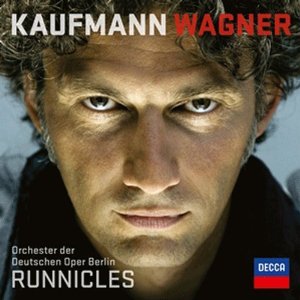|
|
|
|
|
|
|
|
|
Broadwayworld, Aug, 31, 2013 |
| by Richard Sasanow |
|
|
|
BWW Reviews Recordings: Trebs, Jonas and the Bicentennial Boys |
|
 The
first time I heard Jonas Kaufmann was in the Metropolitan Opera's Zeffirelli
production of LA TRAVIATA. I'd gone for Angela Gheorghiu and Kaufmann was
the bonus, I'd thought--until he opened his mouth. I was immediately taken
with the rich, baritonal quality of his tenor, which reminded me of Domingo.
It's the tenor of his, well, tenor, that always catches me by surprise,
whether in Verdi, Gounod or Wagner. For me, those colors in his voice--along
with his secure high notes and dramatic ability, naturally--are what make
Jonas Kauffman: Wagner (Decca 478 5189) so outstanding. The
first time I heard Jonas Kaufmann was in the Metropolitan Opera's Zeffirelli
production of LA TRAVIATA. I'd gone for Angela Gheorghiu and Kaufmann was
the bonus, I'd thought--until he opened his mouth. I was immediately taken
with the rich, baritonal quality of his tenor, which reminded me of Domingo.
It's the tenor of his, well, tenor, that always catches me by surprise,
whether in Verdi, Gounod or Wagner. For me, those colors in his voice--along
with his secure high notes and dramatic ability, naturally--are what make
Jonas Kauffman: Wagner (Decca 478 5189) so outstanding.
Tenor. Cap T. Period
This is not a simply a Verdi tenor, a
French tenor or a heroic Wagner type, but a Tenor. Cap T. Period. You never
have to worry: Will he hit the note? Will he sound like he means it? Will he
be at home in this repertoire? The answer to all is YES. Kaufmann is one of
the special singers--Joan Sutherland comes to mind--whose sound comes so
naturally that it becomes an extension of the speaking voice rather than
something that appears to be put across through technique.
Music from his gut
That said, he's one of those singers you
can't get enough of in Wagner, whether in the high-def broadcast of
LOHENGRIN from La Scala, live at the Met in PARSIFAL or on this disk.
Kaufmann seems to know this music on a very basic level--from his gut. He
sings as if he understands the characters Wagner has drawn all too well and
becomes one with each of them, whether in the opening selection from
SIEGFRIED ("Ein Schwert verhiess mir der Vater," the sword monologue) as he
cries out, urgently, "Wälse!" or in Siegmund's gorgeous soliloquy from DIE
WALKURE, singing of his love for Sieglinde. "In fernem land" from LOHENGRIN
is filled with poignancy and heart.
An elegant prayer
His TANNHAUSER scene is wonderful, as is his elegant performance of the
prayer from RIENZI ("Allmächt'ger Vater, blick herab"), though he probably
isn't ready to tackle these roles on stage. But, give him time. He has a
long career ahead of him. As for the Wesendonck-lieder, which close the
recording, I can't say that I'm a devotee. But in these songs, usually sung
by a soprano, I will admit that Kaufmann makes as strong a case for them as
anyone I've heard. His baritonal sound and ability to modulate his high
notes make a big impact here.
Conductor Donald Runnicles, an
acclaimed Wagnerian, brings out an intensely dramatic performance from the
Chorus and Orchestra of the Deutsche Opera Berlin in this demanding music.
They help make the Wagner outing by this fine, thoughtful singer worth
listening to, again and again.
|
|
|
|
|
|
|
|
|
|
|
|
|
|
|
|
|
|
|